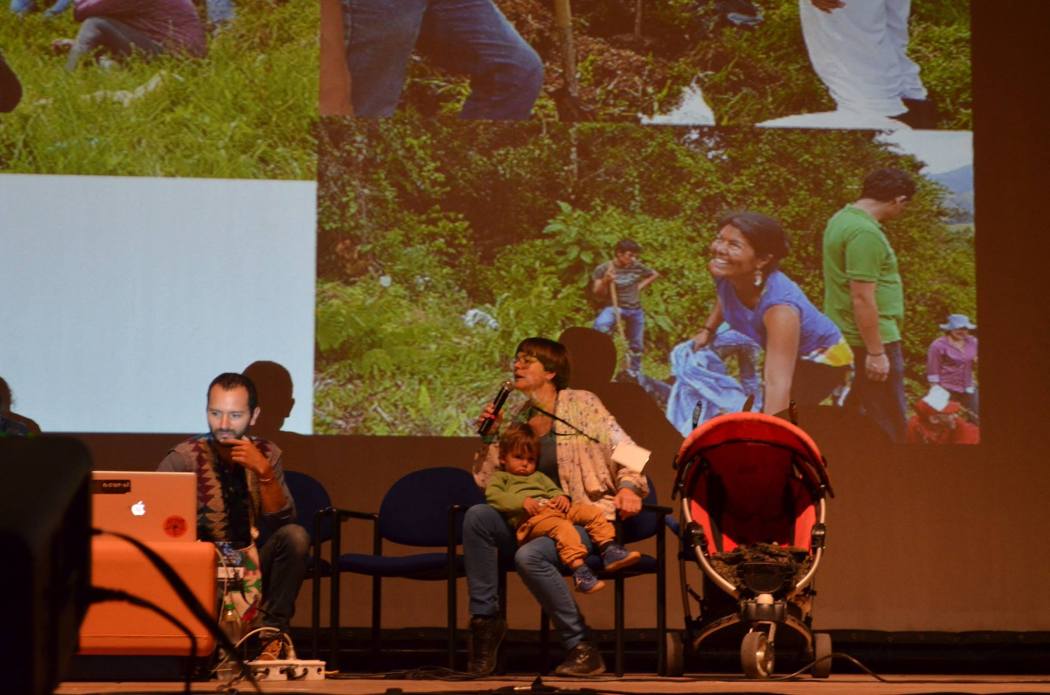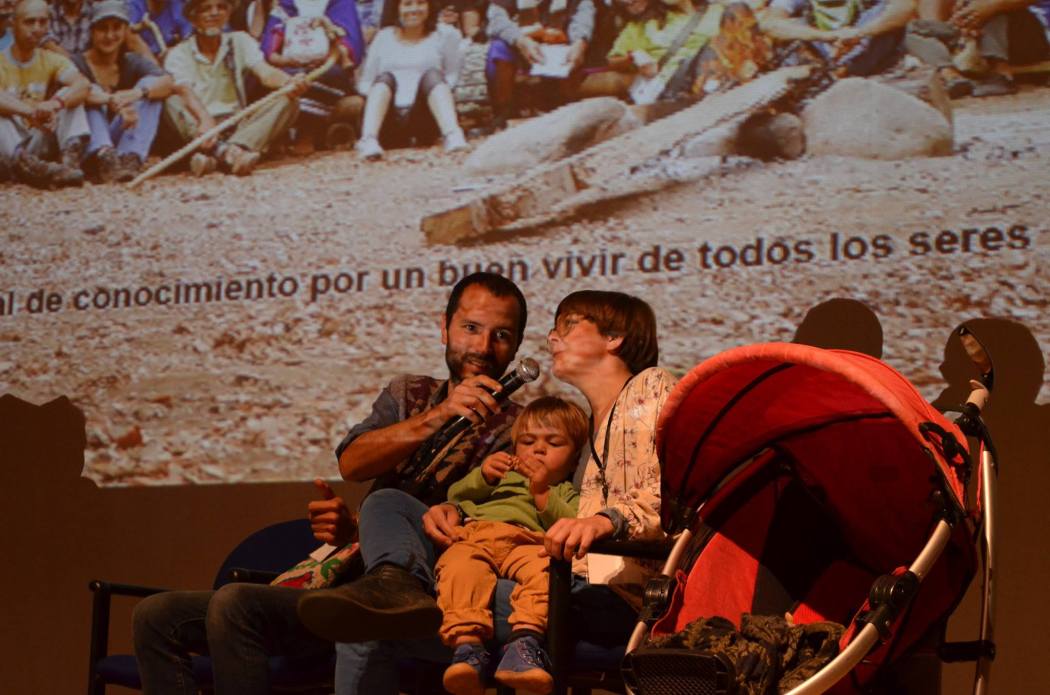Proyectos Rurales Arte Naturaleza Tecnología y Sociedad
Proyectos rurales ANTS (Arte Naturaleza Tecnología y Sociedad) en Latinoamérica
Construyendo una nueva forma de vida, en paz con la naturaleza, asumiendo como urgente nuestro deber de restaurar el daño generado a nuestro Planeta Tierra, como especie habitante de él. Tenemos conciencia de que es una dirección que ya han decidido enfrentar otros con anterioridad y que esperamos sean muchos los que se sumen en este acto de amor y sobrevivencia. Nuestro aporte se origina en nuestros conocimientos de las artes, el trabajo en red y la cultura digital. El cómo implementar estos conocimientos a favor de la restauración de los ecosistemas y sus comunidades. Con una clara valoración y actitud de respeto hacia los pueblos originarios indígenas, reconociéndolos como maestros y guías en esta tarea; Sumado al conocimiento de los propios campesinos.
Mesa redonda
Rural Projects ANT (Art Nature Technology) in Latin America
Pedro Soler • Yto Aranda • Katharina Klemm • Omar Gatica Rivera
Gabriel Vanegas • Daniela Moreno Wray • Luciana Fleischman • Rachel Rosalen
Wednesday June 14, 2017 11:15 – 12:45
Sala Fundadores – CCC Teatro Los Fundadores
ACADEMIC ACTIVITIES // Actividades Académicas, Roundtable.
ISEA2017 – Festival de la Imagen. Universidad de Caldas. Manizales, Colombia.
Minkalab (Colombia) www.minkalab.org
Minkalab is a rural lab that encourages the horizontal exchange of traditional and technical knowledge, the development of a stable social network, the strengthening of local skills, innovative projects and cultural diversity in order to tackle issues of local priority. The lack of autonomy and the lack of access to decent living in the countryside, the loss of biodiversity, the cultural and social isolation in rural areas in Colombia, have encouraged us to create this platform for the exchange of knowledge.
Since 2014 Minkalab has organised various meetings, mingas and collaborative projects in the space.
Pujinostro (Ecuador) residenciadeartistaspujinostro.wordpress.com
Pujinistro is a farm for creators and artists located in Pujilí, in the province of Cotopaxi in the Sierra of Northern Ecuador, 2800 metres above sea level. It is a strategic site for it’s central location, close to the Cotopaxi volcano, the Quilotoa lake and the road to the coast (La Maná). Pujilí keeps Andes culture alive and has a strong tradition of pottery making.
It is an ideal space for creators and artists where people with common interests in the areas of visual arts, digital arts, new and old technologies, can meet, get to know each other, exchange and collaborate in an open way, The space was created out of the necessity for encouraging meetings for creative development, a rural headquarters for critical thinking and experimentation. It is also a place for recovery, sharing bread and thought, meditating, and to be inspired for creation, learning from the rural context and it’s traditional knowledge.
Pujilí in the indigenous kichwa language means “House of Games” and it is precisely this element of play which permeates the space where dialogue flows naturally and generates an open thinking, propulsing an organic educative project which affirms that “education can happen anywhere. At any time.” (Educación Expandida, ZEMOS98).
Selvatorium (Colombia) www.selvatorium.co
Selvatorium is a living laboratory that grows out of the experience of an urban family that has decided to abandon the city and build their life in the Sierra Nevada de Santa Marta in Colombia; a sacred mountain range where nature still vibrates with magic thanks to the spiritual practice of its inhabitants; the Kogui, Arahuaco and Wiwa indigenous people.
There, since 2008 this (our) family and other families and individuals, who have joined the process, form a community with permanent and transient members. Between ourselves and our habitat and neighbors, we have constructed a space in which to live, create, learn, educate our children and share with temporary guests, this experience of existing within nature.
Our objective is for all the members of our community to attain a full and comfortable life as well as to contribute positively to our local and global community and natural environment. We are interested in minimizing our dependency on the monetary system and we aim for autonomy. We wish to learn to utilize modern technology when it is truly worthwhile and recognize and abandon what is superfluous. We have many challenges; health; security; agriculture; home construction; home-schooling of the children; as well as resolving community and spiritual conflicts. We are learning enormously at all levels and are convinced that this way of life is the best we can offer ourselves and our children.
The experience that we (the permanent and transient inhabitants) have; the processes that we invent; the experiments that we try, the reflections we share; the works of art that we create are all a part of the living laboratory Selvatorium. Our space is open and throughout most of the year to receive volunteers and residents, which come to develop personal projects or carry out activities that benefit our community. We have made happen a few events; mainly the Mango Jam during the years 2014 / 15/ 16; a festival that takes advantage of the mango harvest to inspire creative projects related to food sovereignty, art and music.
Rao Caya (Chile) www.raocaya.cl
Rao Caya is a art, nature and technology project that was started in 2015 by Yto Aranda, Omar Gatica and Ytyo Díaz. Its main objective is to conserve the sclerophyll forest (unique to Chile), its flora and fauna in an area of thirty six hectares. The first year we have dedicated to the construction of a cabin, future residences for artists and researchers in areas related to the project. We have also dedicated to build roads, implementing gardens (vegetables, medicinal herbs, fruit trees) and enabling irrigation systems.
The challenges and goals to be developed are: to organize art, nature and technology meetings in the place. Generate a residential program, make a registry of the local wildflowers, implement projects of bio-construction and permaculture, integrate the community, and in the medium term, begin with the recovery of the waters that flow from the mountain slopes. The process will be documented and periodically published on the Internet.
Upayakuwasi (Ecuador) http://upayakuwasi.hotglue.me
Upayakuwasi is a rural space near the town of Cayambe that began in 2016 inspired by the necessity to activate experimental dialogues with the rural context and to generate meetings between artists of different origens, the local communities and the natural environment while questioning our relation to memory, the past and it’s archives, aesthetic practises, imaginaries and relations, resituating the concept of the rural in contemporary narratives.
Cayambe has an important place in the history of the indigenous movement, home to leaders such as Dolores Cacuango, Transito Amaguaña and Jesus Gualasivi and now, for the first time, has an indigenous mayor, Guillermo Churuchumbi. It was also here where the capitalist transformation of the traditional system of the hacienda began, beginning with milk production and, more recently, the intensive cultivation of flowers under plastic that dominate the region and it’s economy.
The first project carried out there, in 2016, was the Transmestizx residence where 17 artists met to invent and develop a collective performance exploring interculturality and diverse identities, the trans as possibility, the memory of indigenous resistance and art as the creation of new imaginaries. This work was exhibited in the Centre for Contemporary Art in Quito.
Upayakuwasi has a house, gardens, library and studio as well as a food treatment workshop called La Divina Papaya. This is a project that is concentrated on the deshydration of organic fruits, flowers and other foods, result of a search for sustainability and ecological management. The workshop is also a laboratory for the exploration of the properties of plants, fruits and flowers, of the local soil and water, nourishing the diverse artistic investigations (such as film scripts, documentaries, or interactive installations) of the residents and users.
Manga Libre (Colombia) www.platohedro.org
Manga libre is a project aimed at rehabilitating a wasteland in the Buenos Aires neighborhood of Medellín left by the demolition of a building that was there before. From 2011 Platohedro started carrying out actions to recuperate the area such as cleaning, planting a community vegetable garden and the collaborative construction of a public structure where the local community gathers. Through various “Mingas”, artistic interventions and the participation of the community this wasteland has been transformed into a garden and natural space in an area that doesn’t have parks close by.
The Platohedro Corporation is a non-profit organization that functions as a collaborative creative platform in the city of Medellín, Colombia. Since 2004 it has been dedicated to the permanent investigation of free culture, self-education, artistic creation and experimentation. These processes are guided by the search for collective well-being based on the philosophy of Buen Vivir (Good Living) and Buen Conocer (Good Knowing).
Nuvem (Brasil) http://nuvem.tk
Nuvem emerged in October 2011 as an initiative where desires, people, actions and thoughts converge, intended to welcome artistic and non-artistic creation and research, located in the mountains 200km from Rio de Janeiro and 300km from São Paulo.
We seek autonomy that aims for sustainability. This autonomy is not only technical – electricity generation, communication networks, etc. – but covers all of life: food, health, body, territory. In a context where cities are becoming increasingly unsustainable, we believe that a rural space is the most appropriate environment for these experiences. The project had a house for ten people, laboratory, teams; now it is based in an experimental farm. Since its founding, more than 300 people have participated in 31 activities that took place in Nuvem.
rural.scapes (Brasil) http://www.ruralscapes.net
rural.scapes – lab in residence is a rural residence program that focuses on research, articulation, reflection and transdisciplinary artistic practices and critical production in the rural environment. rural.scapes – lab in residence works as an interface between regional, state, national and international networks and focuses on the revaluation of the rural environment through a revision of our notions of individual and collective identity in terms of territory. These actions stimulate the development of projects that promote new productive networks and alternative micro-economies, making the region more self-sustaining and fostering new creative dialogues between city and countryside.
Rural culture, traditionally based on the construction of tools and technologies in order to guarantee a self-sustainable survival, could now be recognized or misread as the culture of DIY (Do It Yourself). However, differently from the DIY, the transmission and exchange of this knowledge represent a value of negotiation, which conforms the local socio-environmental dynamics.












